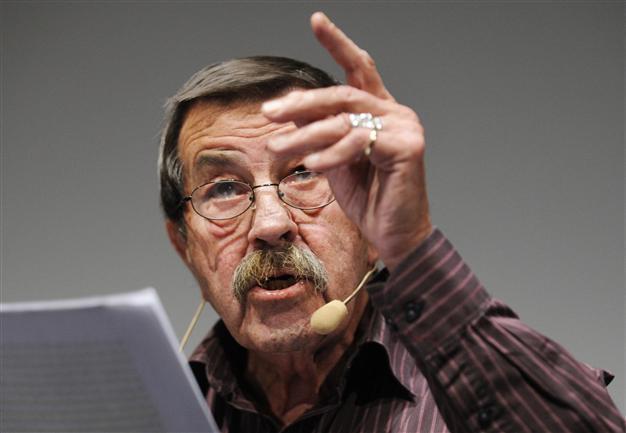Grass hails Israeli nuclear spy in new poem
BERLIN - Agence France-Presse

Picture taken on October 16, 2009 shows German writer and Nobel laureate Guenter Grass reaings an excerpt of his novel "The Tin Drum" accompanied by a percussionist at the 61st Frankfurt Book Fair in Frankfurt. AFP Photo
Nobel prize-winning German author Gunter Grass, declared persona non-grata by Israel over a poem saying it threatened world peace, has published another work critical of the Jewish state.
In one of a collection of 87 new pieces, Grass hails whistle-blower Mordechai Vanunu, who served 18 years in jail for leaking Israeli nuclear secrets to a British newspaper, in a poem entitled "A Hero in Our Time".
He describes former nuclear technician Vanunu as a "hero" and a "role model", according to extracts published by the German news agency DPA.
Earlier this year, Grass, 84, angered Israel after publishing a piece entitled "What Must Be Said", in which he voiced fears that a nuclear-armed Israel "could wipe out the Iranian people" with a "first strike." Israel has since barred him from visiting the country.
Vanunu himself said that he was pleased to be mentioned by a writer of Grass's stature.
"I am very happy to be in the league of Gunter Grass," he told AFP, speaking in English. He compared Israel's ban on a Grass visit to its refusal to let Vanunu leave the country.
"Vanunu would be happy to get from the interior ministry of Israel the title 'persona non grata' and they can send me out of Israel," he said, speaking of himself with his customary use of the third person.
Israeli foreign ministry spokesman Yigal Palmor mocked Grass's poem as "surely no Schiller" adding that at least Grass had found in Vanunu one Israeli worthy of praise.
"There is at least one Israeli who finds grace in his eyes," Palmor said.
Israel is widely believed to be the only nuclear-armed power in the Middle East, with between 100 and 300 warheads, but it has a policy of neither confirming nor denying it has an atomic arsenal.
The Jewish state has refused to sign the nuclear Non-Proliferation Treaty or to allow international surveillance of its Dimona plant in the Negev desert in the south of the country.
Vanunu served 18 years behind bars for disclosing the inner workings of Dimona to Britain's Sunday Times newspaper in 1986.
He was released in 2004 but banned from travel or contact with foreigners without prior permission. He has since been sanctioned more than 20 times for breaking the rules.
